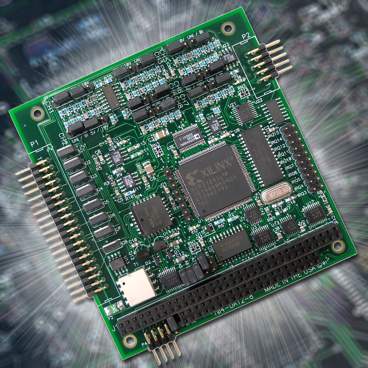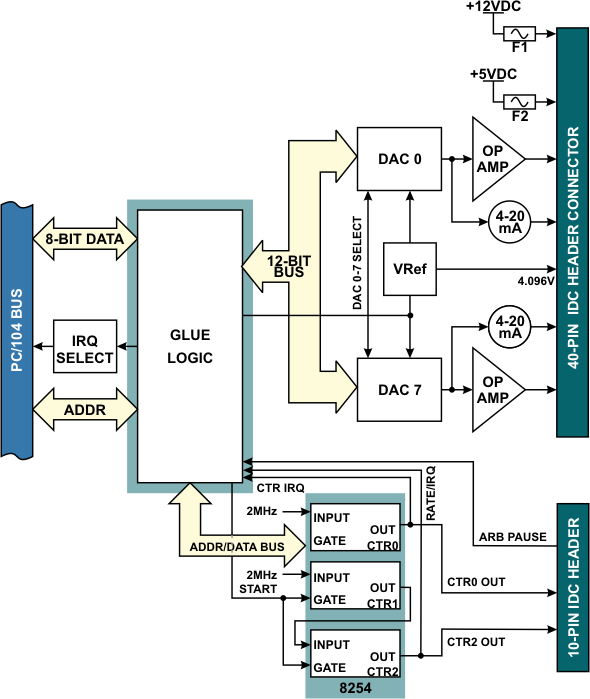104-DA12 Family
PC/104 Analog Output Board with Arbitrary Waveform Generation
Features
- Broadly Configurable Arbitrary Waveform Generator (ARB)
- DACs Independently Programmable with Unique Waveforms
- 128K SRAM for ARB data storage
- Independent 12-bit D/A converter per channel
- DACs independently or simultaneously updated
- Output ranges of 0-5, 0-10, +/-5, +/-10V, corresponding 4-20mA output
- 32-bit counter for precisely timed outputs
- 16-bit counter for interrupt generation
- On-board DC/DC converter allows operation on +5V power
- Optional -40 to +85°C operating temperature
- Available in 4 and 8 channels, with or without the ARB
- RoHS Available. Please contact us for ordering information
- Designed, made, supported, and manufactured in the USA

The DACs can be updated individually or simultaneously. An automatic circuit sets the analog outputs to zero at power-on or reset. Each output is buffered by a short-circuit protected op-amp capable of sourcing up to 5mA. Data for updating each DAC may come from either the board's onboard RAM or from the PC/104 bus. The on-board 128 KB (64K sample) RAM and onboard intelligent circuitry provides flexible allocation of between one and eight FIFO buffers/waveforms.
Arbitrary waveform generation capability becomes increasingly necessary as CPUs are burdened with a greater abundance of complex tasks. An arbitrary waveform is a user-defined set of digital values specified point by point over time. These values are then clocked through a DAC to provide the analog output signal. Virtually any waveform can be created using the software tools provided by ACCES and also by third-party software packages. The ARB relieves some of the load placed on the CPU by handling the waveform generation at the hardware level using on-board memory and control logic. This is especially useful in time-critical applications as outputs remain unaffected by latencies inherent in popular operating systems. ACCES I/O’s ARB architecture allows for total flexibility in allocating the onboard RAM across the channels depending on the complexity of the desired waveform. It is even possible to use the ARB for selected channels while operating the remaining channels in the software driven mode.
Counter/Timers
Three 16-bit down-counters, in a type 8254 IC, are included. These are configured as two frequency sources derived from an on-board 2 MHz crystal-controlled oscillator. Counter/Timers 1 and 2 are concatenated on the board to form a single 32-bit counter.Input/Output Connections
Primary I/O connections (analog reference, voltage and current outputs) are made via a 40 pin header. Fused +5V and +12V are also available on this header. Control and status monitoring of the ARB functions are made at a 10 pin header. Power connections can optionally be made via an 8 pin header behind the PC/104 connector. All I/O connectors are right angle as standard, but are available as vertical as a factory option.SOFTWARE
APPLICATIONS
- Industrial Equipment Control
- Waveform/Audio Synthesis
- Stimulus-Response
- Test
Downloads
Available Reference Manuals
- View / Download the 104-DA12-8 Manual (.PDF)
- View / Download the 104-DA12-8A Manual (.PDF)
- View / Download the Software Reference Manual (.PDF)
- View / Download the Driver Install Guide Manual (.HTML)
Available Software Downloads
Available Datasheets
- View / Download the 104-DA12-8A Data Sheet (.PDF)
Drivers and Downloads
Full list of available Downloads: Software Packages, Drivers, Manuals, and other documents
Information about our Free Software packages:
ACCES is proud to provide a full suite of software support with every Data Acquisition product. We are committed to supporting the most popular operating systems and platforms for our customers. Currently we are actively supporting Windows XP through Windows 10, including "Server 2008," "Embedded," and "Compact" flavors in both 32-bit and 64-bit for all plug-and-play products including PCI, PCI Express, USB, and more. Many products continue to ship with support for additional operating systems such as DOS, Windows 95, 98, Me, NT4, and 2000.
Samples
Among the software we deliver with our products are sample programs in a wide variety of programming languages. These samples are used to demonstrate the software interfaces to our products — and many can be used as-is in your production environments, or to test functionality of the devices out-of-the-box. We're currently actively supporting sample programs in Visual C# and Delphi with many devices including samples in Visual Basic and Visual C/C++, as well as Borland C/C++ 3.1 for DOS. Additionally we provide National Instruments LabVIEW compatible DLLs and demonstration VIs for many of our devices.
Drivers
Drivers for various operating systems are also provided, including active support for Windows XP -> 10 — all in both 32-bit and 64-bit flavors, and including consumer, server, and embedded varieties — as well as the Linux kernels 2.6 and newer and recent macOS versions. Many products continue to ship with driver support for Windows 95, 98, Me, NT4, and Windows 2000, but support for these operating systems is considered deprecated.
Setup Programs and Utilites
Our Data Acquisition devices also include a graphical setup utility that walks you through the process of configuring any option jumpers or switches on the device, as well as explaining a little about the various connectors present.
Many devices also include utility programs - little tools to make your use of the device easier, such as WinRISC, a "Really Incredibly Simple Communications" terminal program that lets you get started instantly with serial devices.
"Register Level" Documentation
Besides all this software in all these languages and operating systems ACCES has a policy of open and transparent development: none of our lowest-level "register" interfaces are hidden from you — we document every register in every bus card, every command in every serial board, and every usb control transfer in every USB Data Acquisition board. These lowest-level interfaces allow you to develop for our products in ANY operating system or language, regardless of our actively supporting it or having a driver for it. We have customers actively developing in ADA, Android, Python, Java, MATLAB, Solaris, and more, just by referring to our complete low-level interface documentation! And we provide the full source code to all of our drivers, regardless of operating system, to give you an even bigger head start in your own development tasks.
No Fees or Royalties
All of this software is provided at no additional charge, and is licensed under any of a variety of flexible — and royalty free — options. Check out our software license explanation if you'd like more information.
non-plug-and-play driver install guide for Windows
Please refer to the Non-PnP Install Guide for instructions to get your PC/104 and ISA bus devices installed in modern Windows.
Custom Software
ACCES also offers Custom Software Services for our products. Our prices are unbelievably low, often as inexpensive as free! If you need something tweaked to support your needs, or an entire enterprise application developed from scratch, it is definitely worth your time to inquire with us, first.
Further information about available ACCES Software:
- Redistributing Windows Drivers
- A list of ACCES drivers and the files that compose them under different versions of Windows, so you can easily redistribute ACCES cards and drivers.
Specifications

Analog Outputs
- 8 Channels
- 50K Conversions per Second throughput, all channels simultaneously
(Aggregate throughput of 400K conversions per second)- 12-Bit Resolution
- 4 jumper selected output ranges per channel, 0-5V 0-10V ±5V ±10V
- Eight corresponding 4-20mA current sink outputs (external 8 to 36VDC excitation required)
- ±2 counts DAC Relative Accuracy (typical)
- 10µS DAC Settling Time (typical, to 3/4 scale)
- ±0.4% of Full Scale DAC Offset Error
- ±0.1% of Full Scale DAC Gain Error (typical)
- Drive Capability of 5mA per channel, Outputs are Short-Circuit Protected
- 30mA cumulative total drive from all DACs
- 4.096V Voltage Reference
Counter/Timer
- Type 82C54
- 3 x 16-Bit Down-Counters
- Counter 0 is an IRQ source (clock-tick interrupt) and frequency source
(counter 0 output is available at P2 connector pin 4)- Counters 1 & 2 are chained (32-bit resolution) and dedicated as the ARB clock
(an interrupt is available based on the DAC update from the ARB)- 2MHz Input Clock Frequency
General
- +5V @ 210mA Power Consumption (typical, no load on the outputs)
- On-board DC/DC Converter allows operation on +5V Power
- Interrupt requests may be generated on channels 3-7 10-12 and 14-15
- Environment Tolerance: 0-70°C, 5% to 95% Humidity (non-condensing)
(-40° to +85°C available with special order)

CE testing & approval must be done at the system level, in the designed enclosure, and is not done on individual boards.
| Model | Price (USD) |
|---|---|
| 104-DA12-8A (with ARB) | 595.00 |
| 104-DA12-8 (without ARB) | 319.00 |
| 104-DA12-4A (with ARB) | 429.00 |
| 104-DA12-4 (without ARB) | 268.00 |